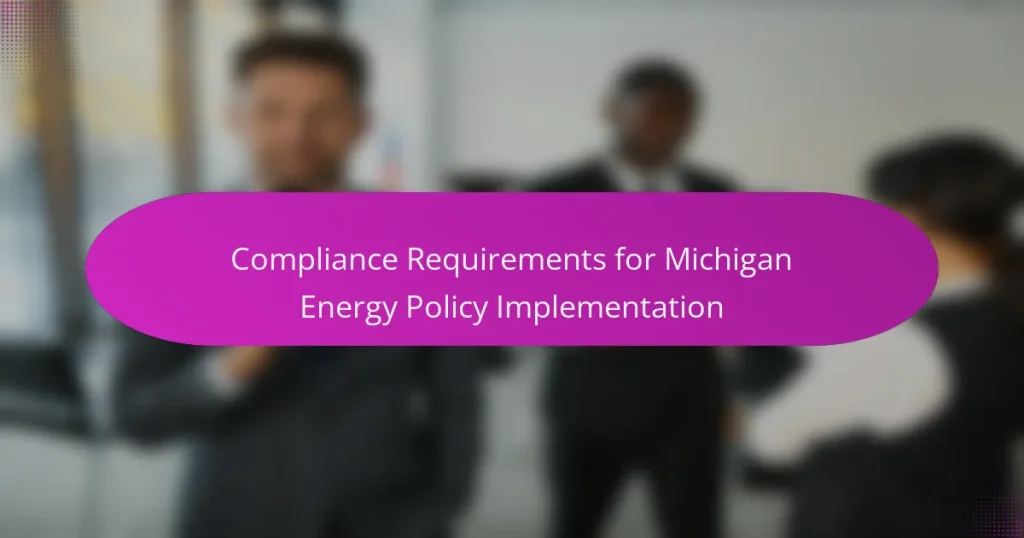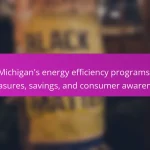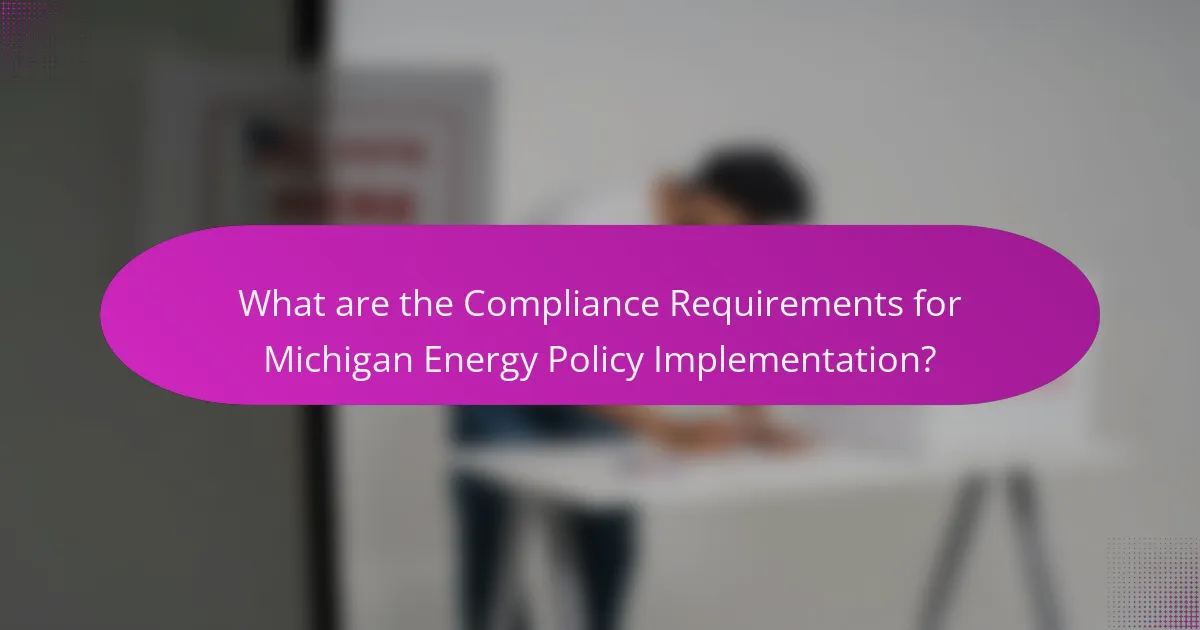
What are the Compliance Requirements for Michigan Energy Policy Implementation?
The compliance requirements for Michigan energy policy implementation include adherence to state regulations and guidelines. Entities must align with the Michigan Public Service Commission’s (MPSC) standards. This includes following the Clean and Renewable Energy Standards. Additionally, utilities must submit annual reports detailing their progress. Compliance also involves meeting energy efficiency targets set by the MPSC. Failure to comply may result in penalties. These requirements are designed to ensure sustainable energy practices in Michigan.
How do these requirements impact energy providers in Michigan?
The compliance requirements impact energy providers in Michigan by increasing operational costs and necessitating infrastructure upgrades. Energy providers must invest in renewable energy sources to meet state mandates. This transition can lead to higher short-term expenses. However, it may also result in long-term savings through increased efficiency. Additionally, these requirements can drive innovation in energy technologies. Compliance may limit the types of energy sources providers can utilize. As a result, some providers may face challenges in maintaining profitability. Overall, the requirements push for a more sustainable energy landscape in Michigan.
What specific regulations must energy providers adhere to?
Energy providers must adhere to regulations set by the Michigan Public Service Commission (MPSC). These regulations include the implementation of the Clean and Renewable Energy Standards. Providers must also comply with the Integrated Resource Planning process. This process ensures that energy supply meets future demand while considering environmental impacts. Additionally, energy providers are required to follow energy efficiency programs mandated by the state. They must report their compliance with these programs annually. Failure to adhere to these regulations can result in penalties or corrective actions. These regulations help ensure reliable and sustainable energy delivery in Michigan.
How do compliance requirements vary among different energy sectors?
Compliance requirements vary significantly among different energy sectors. Each sector, such as renewable energy, fossil fuels, and nuclear energy, has its own regulatory framework. Renewable energy often focuses on emissions reductions and sustainability practices. Fossil fuel sectors are typically subject to stricter environmental regulations due to higher emissions. Nuclear energy compliance involves rigorous safety standards and waste management protocols. For example, the Nuclear Regulatory Commission enforces specific guidelines that differ from those applied to renewable sources. Overall, the variation in compliance requirements reflects the unique risks and impacts associated with each energy sector.
Why are Compliance Requirements important for Michigan’s energy landscape?
Compliance requirements are crucial for Michigan’s energy landscape as they ensure adherence to state and federal regulations. These requirements promote environmental protection and sustainable energy practices. They help maintain grid reliability and support the transition to renewable energy sources. Compliance fosters accountability among energy providers and encourages investment in clean technology. According to the Michigan Public Service Commission, adherence to these requirements has led to a 22% reduction in greenhouse gas emissions since 2005. Furthermore, compliance requirements facilitate access to federal funding and incentives for energy projects. This financial support is vital for advancing Michigan’s clean energy goals. Overall, compliance requirements play a significant role in shaping a sustainable energy future for Michigan.
What role do compliance requirements play in promoting sustainability?
Compliance requirements play a critical role in promoting sustainability by establishing standards that organizations must meet. These standards often focus on reducing environmental impact, enhancing energy efficiency, and encouraging the use of renewable resources. For instance, regulations may mandate emissions reductions or require the adoption of best practices in resource management. Compliance fosters accountability among businesses, ensuring they prioritize sustainable practices.
In Michigan, compliance with energy policies leads to measurable improvements in energy consumption and emissions. The state has implemented specific regulations that drive companies to adopt greener technologies and practices. Studies show that organizations adhering to compliance requirements often achieve significant reductions in their carbon footprint. Thus, compliance not only enforces sustainability but also incentivizes innovation in environmentally friendly practices.
How do these requirements influence energy prices for consumers?
Compliance requirements for Michigan energy policy implementation can significantly influence energy prices for consumers. These requirements often mandate investments in renewable energy and infrastructure upgrades. Such investments can lead to increased operational costs for energy providers. These costs are typically passed on to consumers through higher energy prices. For instance, Michigan’s commitment to renewable energy sources is projected to raise electricity rates by approximately 10% over the next decade. Additionally, compliance with environmental regulations may require utilities to invest in cleaner technologies, further impacting consumer pricing. Overall, the stringent compliance requirements can create upward pressure on energy prices for consumers in Michigan.
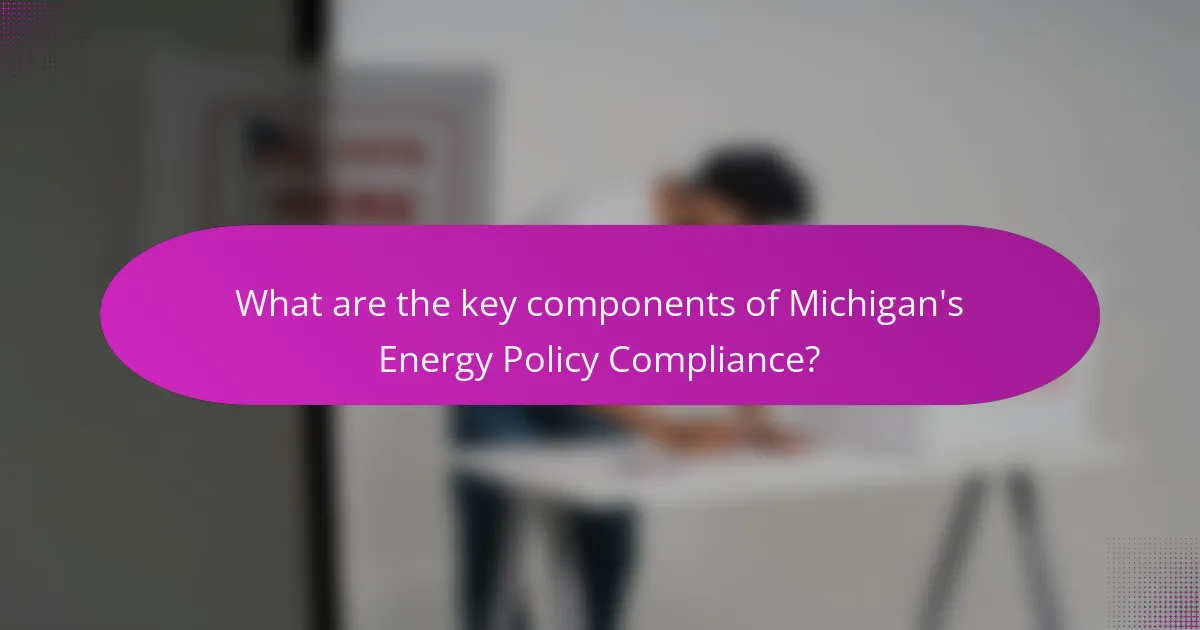
What are the key components of Michigan’s Energy Policy Compliance?
The key components of Michigan’s Energy Policy Compliance include regulatory frameworks, renewable energy standards, and energy efficiency mandates. Regulatory frameworks establish the legal basis for energy policy enforcement. Renewable energy standards require utilities to obtain a specific percentage of their energy from renewable sources. Energy efficiency mandates set goals for reducing energy consumption across various sectors. These components work together to ensure compliance with state energy goals. The Michigan Public Service Commission oversees the implementation and enforcement of these policies. Compliance is measured through regular reporting and assessments of utility performance.
What types of compliance frameworks exist in Michigan?
Michigan has several compliance frameworks. These frameworks include regulatory standards, voluntary programs, and industry-specific guidelines. The Michigan Public Service Commission oversees regulatory compliance for utilities. The Clean Power Plan and Renewable Portfolio Standards are examples of regulatory frameworks. Voluntary programs include the Energy Star program and the Michigan Energy Efficiency Program. Industry-specific guidelines address sectors like transportation and manufacturing. Each framework aims to ensure adherence to energy policies and promote sustainability.
How do these frameworks align with federal energy regulations?
These frameworks align with federal energy regulations by ensuring compliance with national standards and guidelines. They incorporate federal mandates such as the Energy Policy Act and Clean Air Act. These laws set benchmarks for emissions reductions and energy efficiency. The frameworks facilitate state-level implementation of these federal requirements. They also include mechanisms for reporting and accountability. This alignment helps to secure federal funding and support for state energy initiatives. Furthermore, adherence to federal regulations promotes consistency across state lines. Overall, these frameworks serve to integrate local policies with overarching federal objectives in energy management.
What are the penalties for non-compliance in Michigan?
Penalties for non-compliance in Michigan can include fines, sanctions, and legal actions. Specific penalties vary depending on the nature of the non-compliance. For instance, violations of energy efficiency standards may result in monetary fines. These fines can reach thousands of dollars per incident. Additionally, non-compliance can lead to enforcement actions by regulatory agencies. Such actions may include orders to cease operations or remediate issues. Repeat offenders may face increased penalties. These measures are in place to ensure adherence to Michigan’s energy policies.
How is compliance monitored and enforced in Michigan?
Compliance in Michigan is monitored through regulatory agencies and specific legislative frameworks. The Michigan Public Service Commission (MPSC) oversees compliance with energy policies. They review utility reports and conduct audits to ensure adherence to regulations. Violations can lead to penalties, including fines or corrective actions. Additionally, stakeholder engagement is encouraged to promote transparency. Public hearings and comment periods allow for community input on compliance issues. The state also utilizes performance metrics to assess utility compliance effectively. These measures ensure that energy policies are implemented as intended.
What agencies are responsible for overseeing compliance?
The Michigan Public Service Commission (MPSC) is responsible for overseeing compliance with energy policy implementation. MPSC regulates utilities and ensures adherence to state energy laws. The Michigan Department of Environment, Great Lakes, and Energy (EGLE) also plays a role in compliance oversight. EGLE focuses on environmental regulations related to energy policies. Additionally, the Michigan Department of Licensing and Regulatory Affairs (LARA) oversees business compliance within the energy sector. These agencies work together to ensure that energy policies are effectively implemented and followed in Michigan.
How does the reporting process work for energy providers?
Energy providers report data to regulatory agencies to ensure compliance with state policies. This process typically involves collecting information on energy production, consumption, and emissions. Providers must submit regular reports, often quarterly or annually. These reports include metrics such as total energy generated, sources of energy, and customer usage statistics.
In Michigan, energy providers follow specific guidelines set by the Michigan Public Service Commission. The commission requires detailed reporting to assess compliance with energy efficiency standards. Providers may also need to disclose renewable energy credits and their impact on emissions reductions.
Accurate reporting is critical for regulatory oversight and policy effectiveness. Failure to comply with reporting requirements can result in penalties or corrective actions.
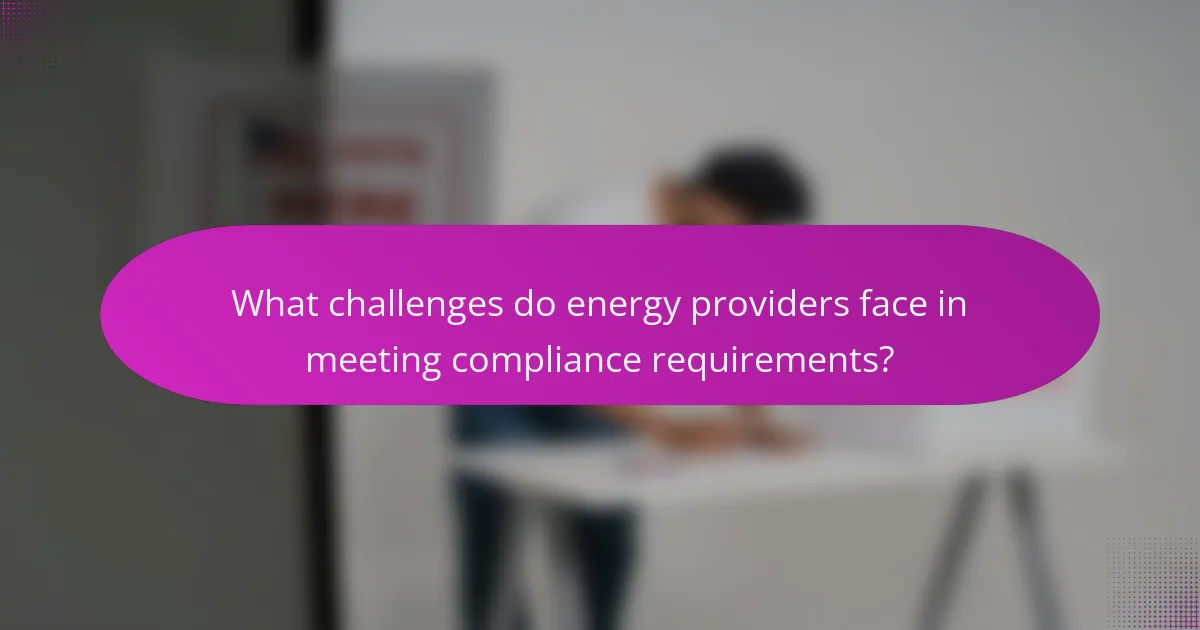
What challenges do energy providers face in meeting compliance requirements?
Energy providers face several challenges in meeting compliance requirements. Regulatory complexity makes it difficult to navigate various laws and regulations. Frequent changes in legislation can lead to confusion and increased operational costs. Limited resources can hinder the ability to implement necessary compliance measures effectively. Additionally, the need for continuous monitoring and reporting can strain existing systems. The integration of renewable energy sources adds another layer of complexity to compliance. Energy providers must also address stakeholder expectations and public scrutiny. Non-compliance can result in significant financial penalties and reputational damage. These challenges require strategic planning and investment in compliance infrastructure.
What are the common obstacles to achieving compliance?
Common obstacles to achieving compliance include lack of awareness, insufficient resources, and complex regulations. Organizations often struggle with understanding the specific requirements of compliance. Many lack the necessary financial and human resources to implement compliance measures effectively. Additionally, regulatory frameworks can be intricate, making it difficult for entities to navigate them. The absence of clear guidelines further complicates compliance efforts. In Michigan, the energy policy landscape is evolving, which adds to the challenges. Organizations must also contend with varying interpretations of compliance requirements among different stakeholders. These factors collectively hinder the ability to achieve full compliance with energy policies.
How do financial constraints impact compliance efforts?
Financial constraints significantly hinder compliance efforts in energy policy implementation. Limited budgets restrict the resources available for necessary compliance activities. Organizations may struggle to invest in technology or personnel needed for compliance. This can lead to gaps in adherence to regulations. Studies show that companies facing financial limitations are more likely to prioritize short-term costs over long-term compliance. As a result, they may incur penalties for non-compliance. Furthermore, financial constraints can reduce the frequency of audits and training programs. This ultimately affects the overall effectiveness of compliance strategies.
What technological challenges arise in the compliance process?
Technological challenges in the compliance process include data integration, system interoperability, and cybersecurity threats. Organizations often struggle to consolidate data from various sources. This fragmentation can hinder accurate reporting and compliance tracking. System interoperability issues arise when different technology platforms do not communicate effectively. This can lead to delays and errors in compliance processes. Cybersecurity threats pose risks to sensitive compliance data. Breaches can result in significant legal and financial penalties. Additionally, keeping up with evolving technology standards complicates compliance efforts. Organizations must continuously adapt to new regulations and technological advancements. These challenges highlight the need for robust compliance management systems.
What best practices can energy providers adopt for compliance?
Energy providers can adopt several best practices for compliance with Michigan energy policy. First, they should regularly review and understand state regulations. This ensures they are aware of current requirements and any changes. Second, implementing robust data management systems is crucial. These systems help track compliance metrics and report accurately to regulatory bodies. Third, conducting regular audits can identify gaps in compliance. Audits provide a clear picture of operational adherence to policies.
Additionally, energy providers should engage in continuous training for their staff. Training ensures that employees are knowledgeable about compliance requirements. Collaborating with industry stakeholders can also enhance compliance efforts. This collaboration fosters sharing of best practices and innovative solutions. Finally, maintaining transparent communication with regulators builds trust and facilitates smoother compliance processes. These practices collectively strengthen compliance with Michigan energy policy.
How can energy providers streamline their compliance processes?
Energy providers can streamline their compliance processes by implementing automated compliance management systems. These systems can track regulatory changes and ensure timely updates to compliance documentation. Automation reduces manual errors and increases efficiency in data collection and reporting. Utilizing cloud-based solutions allows for real-time access to compliance data across teams. This approach fosters collaboration and transparency in compliance tasks. Additionally, regular training and updates for employees on compliance requirements enhance adherence. Studies show that organizations using automated systems reduce compliance costs by up to 30%. This evidence supports the effectiveness of technology in improving compliance processes.
What resources are available to assist with compliance efforts?
Resources available to assist with compliance efforts include regulatory agencies, industry guidelines, and training programs. The Michigan Public Service Commission (MPSC) provides regulatory guidance. The U.S. Department of Energy offers compliance resources and best practices. Industry associations, like the Michigan Energy Innovation Business Council, provide networking and support. Online platforms host webinars and training sessions on compliance standards. Compliance software tools assist in tracking and reporting requirements. Local universities may offer courses on energy policy compliance. These resources help organizations navigate compliance effectively.
What are the future trends in Michigan’s energy policy compliance?
Future trends in Michigan’s energy policy compliance include a shift towards renewable energy sources. The state aims to achieve 50% renewable energy by 2030. This aligns with national trends focusing on sustainability and carbon reduction. Increased investment in wind and solar energy infrastructure is expected. Additionally, energy efficiency programs will likely expand to reduce consumption. The state is also enhancing regulatory frameworks to support compliance. Collaboration with local governments and stakeholders will be crucial for effective implementation. These trends reflect a broader commitment to environmental sustainability and energy independence.
How might upcoming legislation impact compliance requirements?
Upcoming legislation may significantly alter compliance requirements for Michigan energy policy implementation. New laws can introduce stricter regulations and standards for energy efficiency. These changes may require businesses to adopt new technologies and practices. Compliance deadlines may also be shortened, increasing urgency for adaptation. Additionally, penalties for non-compliance could become more severe, incentivizing adherence. Stakeholders must stay informed about legislative developments to ensure compliance. The Michigan Public Service Commission often updates guidelines in response to new laws. This creates a dynamic regulatory environment that businesses must navigate carefully.
What innovations are being introduced to facilitate compliance?
Innovations being introduced to facilitate compliance include advanced data analytics and automation technologies. These tools enable real-time monitoring of energy usage and regulatory adherence. Artificial intelligence is being used to predict compliance risks and optimize energy management. Blockchain technology is enhancing transparency in energy transactions and compliance tracking. Mobile applications are providing stakeholders with easy access to compliance information and reporting tools. These innovations streamline processes and reduce administrative burdens. Enhanced training programs are also being developed to ensure stakeholders understand compliance requirements effectively. Together, these innovations create a more efficient compliance landscape for Michigan’s energy policy implementation.
The main entity of the article is the compliance requirements for Michigan energy policy implementation. The article outlines the regulatory frameworks established by the Michigan Public Service Commission (MPSC), which include adherence to Clean and Renewable Energy Standards and energy efficiency targets. It discusses the impact of these compliance requirements on energy providers, including operational costs, infrastructure upgrades, and potential penalties for non-compliance. Additionally, the article explores the variations in compliance across different energy sectors, the importance of compliance for promoting sustainability, and the challenges faced by energy providers in meeting these requirements. Finally, it highlights future trends and innovations that may influence compliance efforts in Michigan’s energy landscape.
